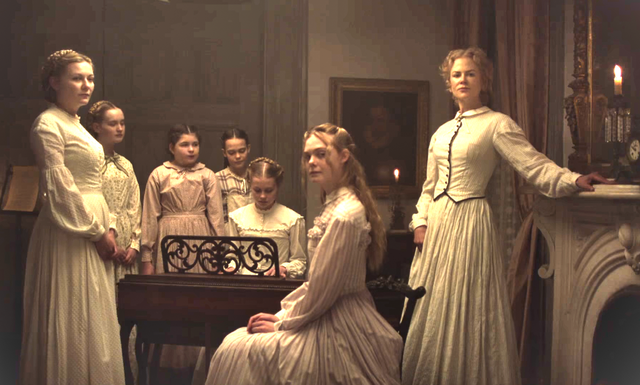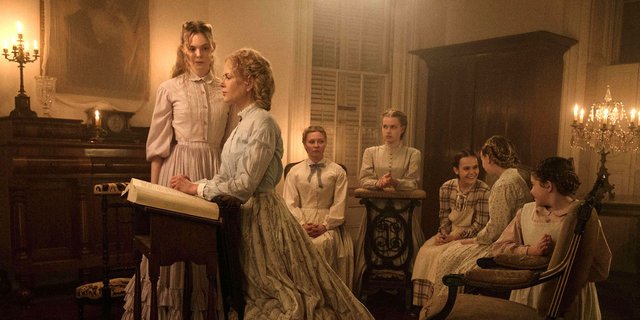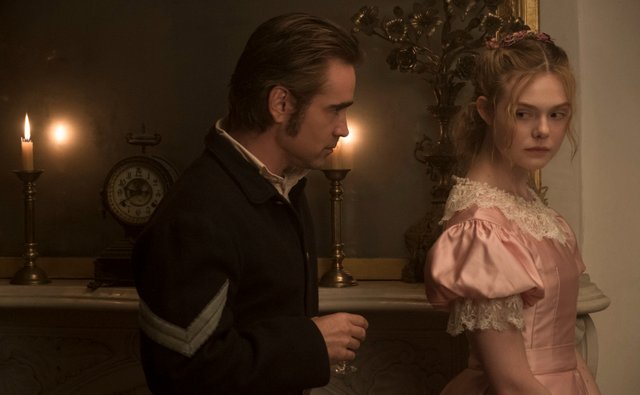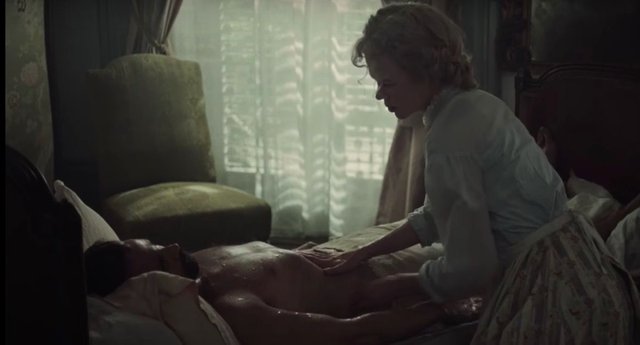/ The Beguiled / Sofia Coppola / review

Almost nothing has been discovered in the lives of young girls whose simplicity of everyday learning gradually disrupts a sudden visit. A short segment was caught before he emerged, images of greenery through which the sun was penetrating, and mild childish singing followed by rhythmic steps. With just two motives, we have been introduced into a story that begins with the arrival of wounded soldier John McBurney (Colin Farrell) to a girls school led by Martha Farnsworth (Nicole Kidman) in Virginia during a civil war in America, the phenomenon of which is the cause of the outburst of suppressed emotions.
Sofia Coppola likes to tone a movie through minor details, so the lace of lace-white curtains in a light wind is in accordance with innocent girls who are in contact with something stronger than their power. All that the director reveals doesn't come out of the boundaries of their garden, their world. More often we get the impression that their steps are viewed from a distance, behind the trees, behind the fence, but this reinforces the framing of their isolated world. As they do not have contact with the outside world, nor with a war that is unfolding.

Everything is closed in a small environment that will soon be shaken, triggered and allowing it to retreat. With her previous films, where Scarlett Johansson in Lost in Translation is fiddled with the rest of the world, and watching the world from the window, curled up in her safety, but inside burning with feelings, and Marie Antoinette, who in the unknown searches for a safe ground from a world she does not know, Coppola developed to perfection her skill of building the isolation of her characters
The Beguiled, the film by Sofia Coppola, for which she won the Best Director Award at this year's Cannes Film Festival, is an adaptation of the novel by Thomas P. Cullinan. In 1971 with Clint Eastwood in main role, a film of the same name was shot. While Don Siegel's adaptation from the last century is dirty and violent, in which nothing remains unspeakable, even short inner monologues of characters appear to make their thoughts clearer, Copolla's adaptation is almost sterile.
Each view of a character is left to our interpretation, each movement is bold, but silent, and a culminating event is not displayed.

In the musical instruments room, the wounded soldier John McBurney is lying, and as a magnet he attracts the pushed impulses that occur under the locked room. Daily commitments of girls, from lectures to evening prayers, do not interrupt the conscious appearance of a man in their area, but already on the first day of his arrival there are significant changes in the behavior of girls, from new brooches and more beautiful dresses to short absences and escape to a locked room where they subtly steal a farewell word or a kiss.
The film almost nationalistically reveals the biological need that girls have suppressed in their isolated community. Teacher Edwin (Kirsten Dunst) gets a special affection in the soldier who gives her an understanding, and he gives it to an eleven year old girl who found him, who only wants a playful conversation and friendship from a man, while Alicia (Elle Fanning) requires special affection for her newly discovered sexuality which he is willing to give. McBurney more carefully enters Martha's armor, raising it by claiming her independence and strength.

Colin Farrell skillfully favors the affection of all the girls, but also gives the audience discretely the impression that comes from his own isolation, from the war, from the lack of women's gentleness, and becomes fascinated by the appearance of so much mildness, but also the special features of the character revealed by these women. This is not a story of the male world and its castration, or of incest and feminine distrust of men, as in the adaptation of 1971. Coppola wants to emphasize those moments between the events that trigger the story.
In the combing of long blond hair, waiting, jointly adding a mushroom bowl on the last evening, in the nature that is louder than the thoughts of the girls, Copolla reveals more about the story than the words itself. Coppola avoids words because it relies on the audience's sense, relying on our interpretation of motifs and details that slowly and with the outstanding gradation of the story reveals.
This was my translation from Croatian to English from Ziher hr article ''Skriveni nagoni pod zaključanom sobom'' by K. Zrinka Saric
Nice review! I saw this movie recently and really enjoyed it.